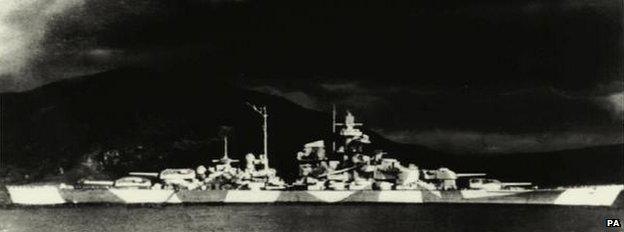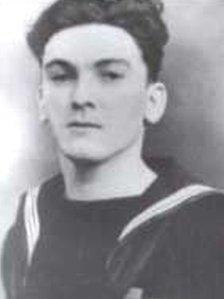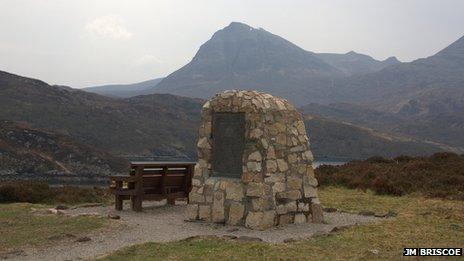X men: World War II's midget submarine crews
- Published

Tirpitz, the pride of Nazi Germany's surface fleet, was targeted in several attacks from the air and sea
The 70th anniversary of a midget submarine raid against a German battleship is being marked. The mission of 1943 was one of several attempted using small, dangerous X-craft.
Below the curving Kylesku Bridge in Sutherland is a memorial recalling the exploits of the XIIth Submarine Flotilla.
The flotilla's submariners trained in nearby Loch Cairnbawn in the use of X-craft, 52ft-long subs armed with explosive charges, for an attack against the mighty Tirpitz.
Protected by anti-torpedo and submarine nets in Norway's Alten Fjord, the heavily armed German battleship was a threat to convoys of Allied ships supplying Russia with weapons and munitions.

James Magennis was honoured for his actions on a Far East X-craft op
Its presence required the Royal Navy to keep warships, badly needed in other theatres of the war, in the North Atlantic.
After aerial attacks had failed to sink Tirpitz, it was proposed that six X-craft - each with three crew and a diver - be used in an ambitious attempt to sink it.
Two veterans of that mission, one of them John Lorimer, from Ayrshire, will lay wreaths at the Kylesku Bridge memorial on Sunday.
Mr Lorimer, today a retired Royal Navy commander, was a young submariner on X6, one of six X-craft towed by standard submarines from Loch Cairnbawn for the attack on Tirptiz.
X8 and X9 were lost during the 10-day tow to Norway. X10 was abandoned close to the target because of mechanical failures and X5 was sunk after coming under fire.
X6 commanded by Lt Donald Cameron and X7 with its crew led by Lt Godfrey Place pressed on with the assault.
A leak
In an interview with The Telegraph, external, Mr Lorimer said X6 had slipped through the submarine and torpedo nets when they were opened to allow boats carrying German sailors pass through.
But the X-craft's crew were forced to abandon the mission when the vessel first struck an uncharted rock before a leak in the periscope caused in a fire onboard.
The men managed to release their charges close to Tirpitz before scuttling their craft and surrendering.
X7 successfully placed its charges but was damaged when they exploded. Two crew were killed while the others were captured.
Various members of the operation were later recognised for their actions. Two Victoria Crosses, three Distinguished Service Orders and one Conspicuous Gallantry Medal were awarded.

Lancaster bombers destroyed Tirpitz in late 1944
Tirpitz had been crippled, but not destroyed.
On 12 November 1944, Lancasters flying out of Lossiemouth on Scotland's Moray coast finished the job by bombing the battleship.
About 10 minutes after the first bombs hit, the vessel turned on its side.
Clean the hull
There were other X-craft operations during the war while Loch Striven, a sea loch in Argyll, was also used for training the crews.
In January 1944, X20 landed hydrographic experts on Normandy's beaches as part of the preparations for the D-Day Landings. The same X-craft along with X23 helped to guide the first wave of the Allied landings.
X24 sank a floating dock used to repair U-boats in Bergen, Norway.

Memorial to the men of the XIIth Submarine Flotilla
The mini subs and their crews were also deployed in the Far East.
XE4 and XE5 cut telephone cables used by various elements of Japan's military to communicate between Saigon, Hong Kong and Singapore. In July 1945, XE1 and XE3 sank the Japanese battle cruiser Takao.
Seaman James Magennis, from Belfast, took part in the attack on Takao.
He had to leave the submarine to clean the hull of the ship so mines would attach and then manually release one of the mines which would not detach from his X-craft.
Magennis won the Victoria Cross and a stone and bronze memorial was erected in his honour in the grounds of Belfast's City Hall in 1999.
Service on X-craft came with great risks even in friendly waters.
On 31 October 1943, external, X22 was lost with all four crew in the Pentland Firth following a collision with the submarine towing it.
- Published11 September 2013
- Published20 July 2011